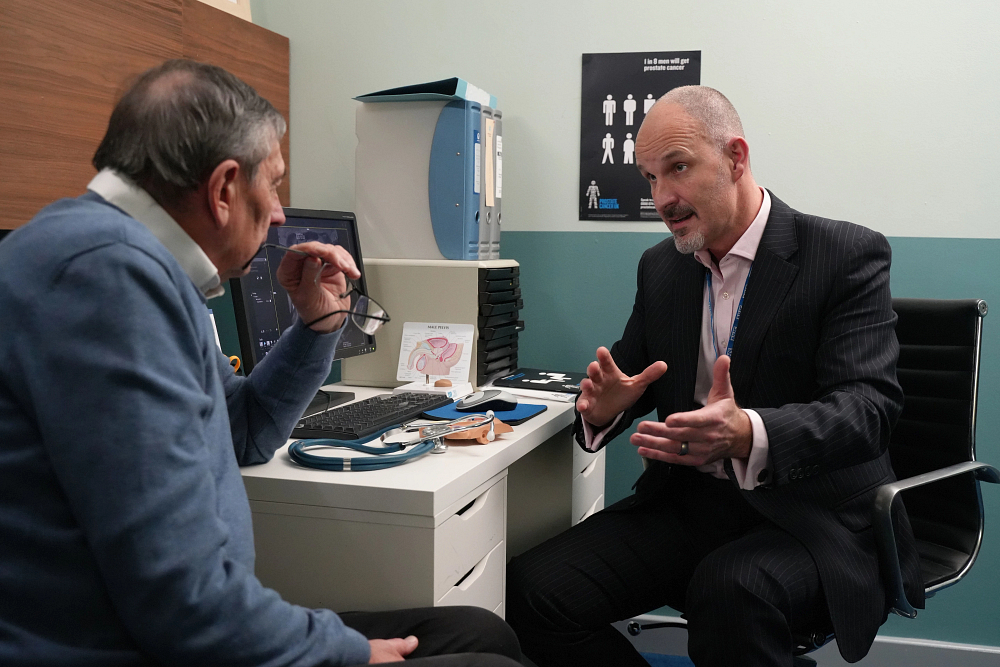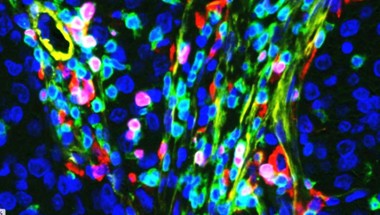Research
10 Jan 2025New drug could treat prostate cancer that stops responding to hormone therapy
Research into a new treatment already being tested in other cancers could give men with advanced prostate cancer more options if hormone therapy fails.

A new drug currently being trialled in ovarian cancer could also help men with advanced prostate cancer, according to research you helped to fund.
The discovery could be a game-changer for men whose cancer has stopped responding to hormone therapy, as they currently have few treatment options open to them.
A team at The Institute of Cancer Research, London (ICR), found that the drug slowed the growth of prostate cancer, including in cells that had become resistant to the hormone therapy enzalutamide.
Although hormone therapies like enzalutamide and abiraterone transform the lives of thousands of men with advanced prostate cancer every year, most will eventually find their cancer stops responding to these treatments.
Disrupting cancer’s protection mechanisms
The new drug targets a mechanism that cells use to protect themselves in harmful conditions, such as high temperatures – but which cancer cells can hijack to cope with the stresses they come under in a developing tumour.
This mechanism, known as the heat shock response, leads to the production of molecules called heat shock proteins.
When analysing data from over 400 prostate cancer samples, the team at the ICR found that samples containing more of these heat shock proteins also showed more signs of growth and development. They also found that men whose prostate cancers had higher levels of heat shock proteins were more likely to die sooner.
This suggests that disrupting the heat shock response could help slow the growth of prostate cancer – and this is precisely what the team found.
The drug (currently named NXP800) slowed the growth of prostate cancer cells, even those that were resistant to enzalutamide.

Slowing the growth of prostate cancer
NXP800 also slowed the growth of mini tumours, grown in the lab from donated prostate cancer samples, whereas enzalutamide only had a small effect at very high doses.
Compared to cancer cells, typically grown in a flat dish, mini tumours better resemble how prostate cancer behaves in the body, so this adds further weight to the results.
Finally, the drug also slowed cancer growth in mice with prostate cancers that were resistant to hormone therapy. Without NXP800, all tumours doubled in size in 38 days. But when treated with the drug, only 37.5 per cent of tumours reached that size in that time.
All these results will help NXP800 move towards the next stage of research – clinical trials – where its effectiveness can be tested in men.
Promisingly, NXP800 has already been given special designations by the US Food and Drug Administration (FDA) to speed up its development, because of its potential to treat a range of other cancers including a type of ovarian cancer and peritoneal cancers.
Exciting step towards tackling treatment resistance
Simon Grieveson, our Assistant Director of Research, said: “For men with advanced prostate cancer, treatment with hormone therapy can be very effective at delaying cancer progression. However, eventually these treatments are likely to stop working.
“This is a critical problem we need to address through continued research into brand new approaches to treating prostate cancer, and this is a fantastic example.
“These findings provide valuable insight into the role of heat shock proteins, which we now know are at a higher level among advanced prostate cancer patients and associated with worse outcomes.
“Targeting these proteins with this novel drug could give men with hormone resistant prostate cancer a new option for treatment and, crucially, more valuable time with their loved ones.
“Clinical trials are now needed, but this is an exciting step towards a new solution to tackling treatment resistance in prostate cancer.”

New avenue for treating advanced prostate cancer
Study co-leader Dr Adam Sharp, leader of the Translational Therapeutics Group at the ICR, and honorary consultant medical oncologist at The Royal Marsden, said: “With this research, we’ve shown that targeting the heat shock response pathway – a pathway responsible for enabling tumours to withstand stress and keep growing – is a potential new avenue for treating advanced prostate cancer.
“The pathway impacts the hormone signalling that drives cancer, but it’s not susceptible to the usual mutations that drive drug resistance.
“Excitingly, we’ve shown that targeting this pathway can slow the growth of prostate cancer tumours – even for tumours that are resistant to hormone therapy. The next step will be to assess if certain prostate cancer patients would respond better than others.”
Study co-leader Professor Johann de Bono, regius professor of cancer research at the ICR, and consultant medical oncologist at The Royal Marsden, said: “We have shown that people with prostate cancers with higher levels of heat shock proteins have significantly worse outcomes.
“If targeting these proteins proves effective in clinical trials, patients with advanced prostate cancer will be able to look forward to longer and better-quality lives.”







